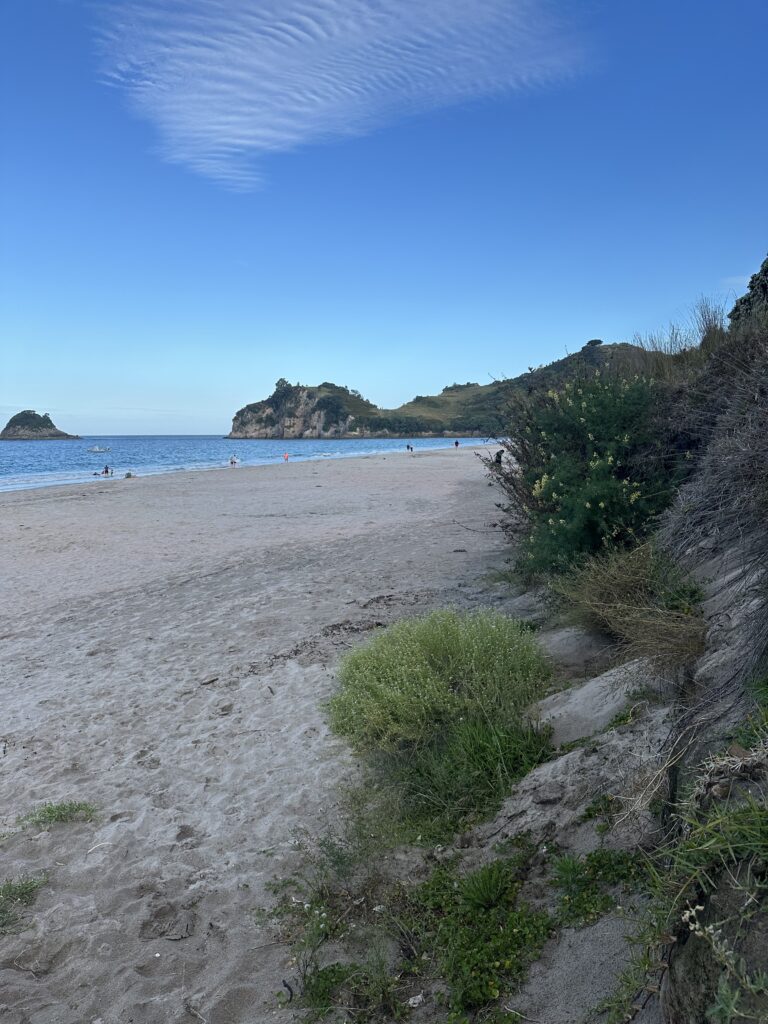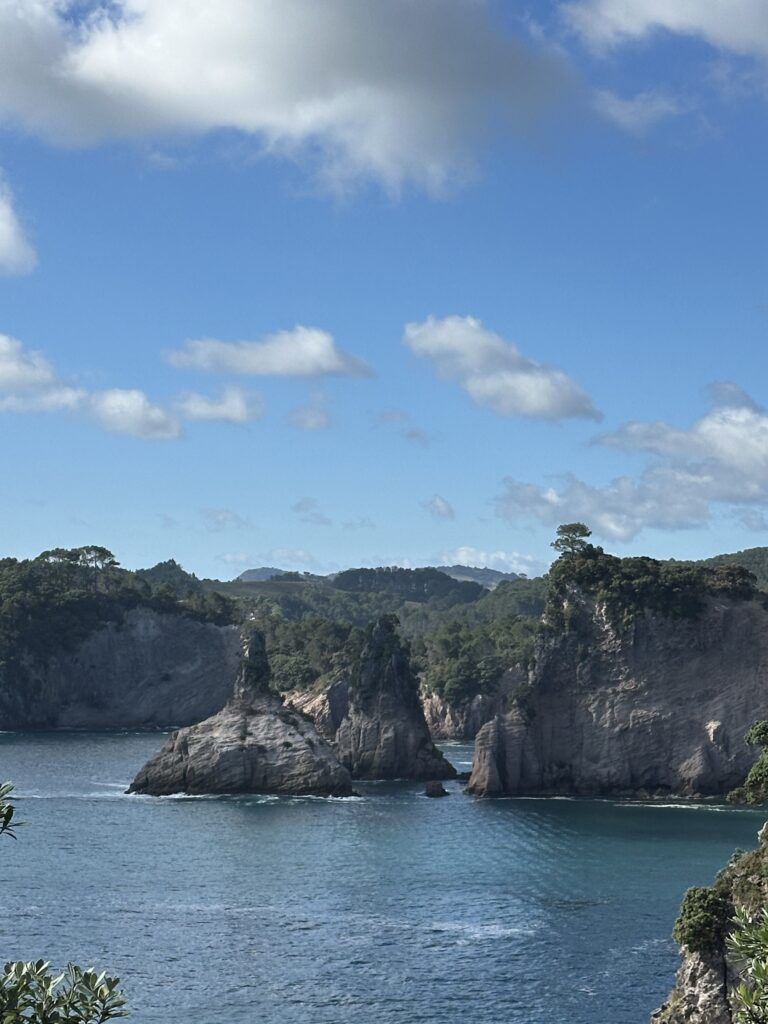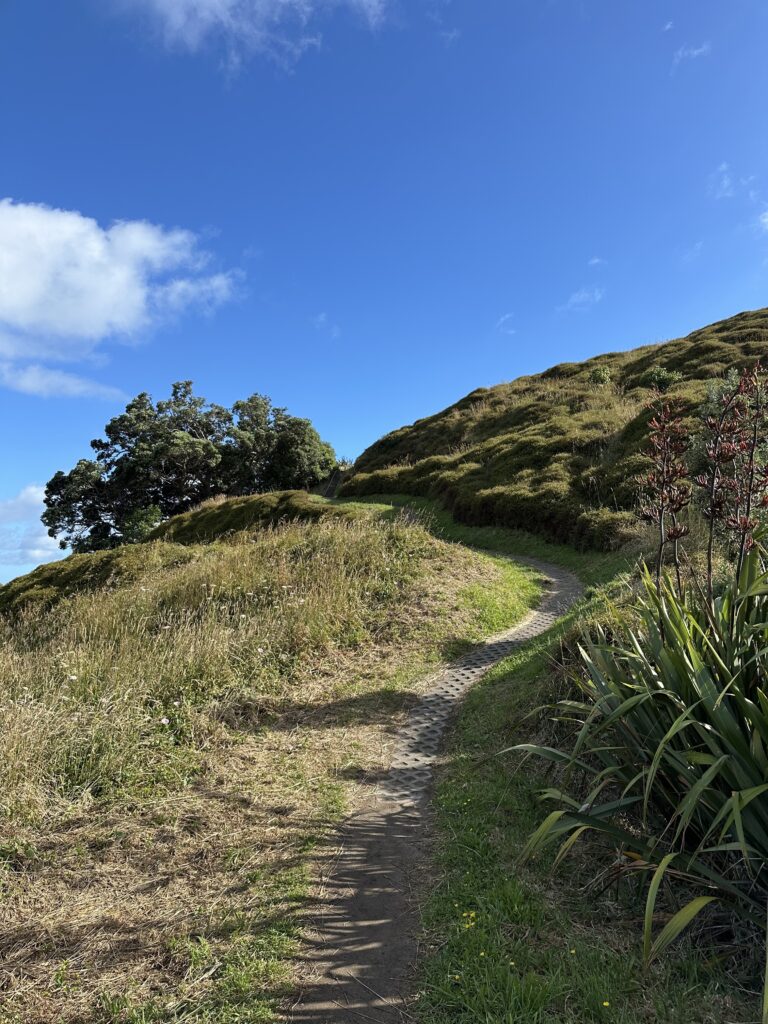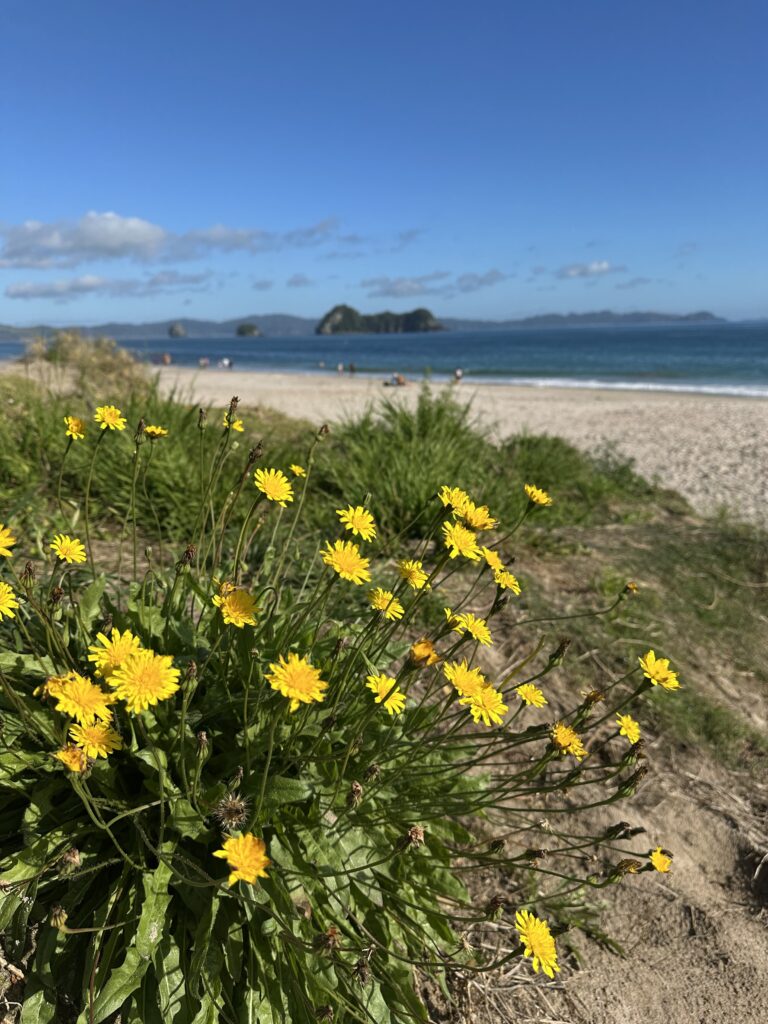And I’m sorry that this post is SO LONG. I have sprinkled in beautiful photos of New Zealand to hold your interest.
When I was visiting my family and friends in the States last October, I had a number of people ask me to report back on what it was like to have Christmas in summer. I am reporting back to tell you that, much like my December “birthday,” Christmas felt like “Christmas,” in quotes. Don’t get me wrong; it was an absolutely lovely day. It just didn’t feel like Christmas as I know it.
I spent the day at a friend’s house with Stu and the boys. Temperatures were in the mid 70s and sunny, and the backyard was filled with vibrant blooms of flowers. We barbecued in the back yard (as one does in New Zealand on December 25th) and played with the boys’ new presents. And then I had the utmost honor/honour of decorating the pavlova, which is a traditional meringue-based dessert that originated in New Zealand NOT IN AUSTRALIA. This is a hotly, hotly contested subject, and since I am applying for residency in New Zealand, I feel it necessary to emphasize that the pavlova is, without a doubt, obviously, a dessert of Kiwi origin. Wherever it originated, pavlova, particularly when homemade and slightly gooey on the inside and slightly crusty on the outside, is delicious.

But man oh man, does it feel bizarre listening to Christmas carols and unwrapping gifts in summer. At one point, while helping to tidy up the wrapping and tissue paper, I reflexively turned to throw them into the fireplace. Muscle memory, I suppose.
And even though we didn’t end up making it to midnight, it was also a trip celebrating New Year’s Eve doing something other than standing around a bonfire in the snow wearing a winter jacket, boots, scarf, mittens, and a hat, feeling 50% festive and 50% miserable, drinking beer just to stay warm. By the way, New Zealand is one of the first countries in the world to enter the New Year. The first country is the tiny island nation of Kiribati, but they only beat NZ by an hour. (Hawaii is one of the last places in the world to see the New Year).
On to the visa update...
Five days ago, I submitted my application for the second of three visas. I should hear back in about 7 months [nervous exhale].
Since it’s been a while, let me reiterate my visa situation as it stands:
I am currently here on a one-year Partner of a New Zealander Work Visa, which expires May 21, 2025. The next one, which I just applied for, is the Partner of a New Zealander Resident Visa. Before you freak out with excitement, this is not “THE” visa that grants me permanent residency, which is the end goal. What this visa does is allow me to continue to live and work in NZ, and travel to and from NZ, for two years. Basically, it extends my current situation by 24 months. (Something puzzling that I recently worked out: Immigration has the length of stay for this visa as “Indefinite,” but it also says “Your travel conditions will expire 2 years from the date you first arrive in New Zealand as a resident.” Confused by this seeming contradiction, I did a deep dive and found out that apparently, you can live and work in NZ for the rest of your life just on a Resident Visa–so long as you never leave NZ after your “travel conditions” expire).
Please enjoy this picture of a full rainbow over Mercury Bay that I took back in September:
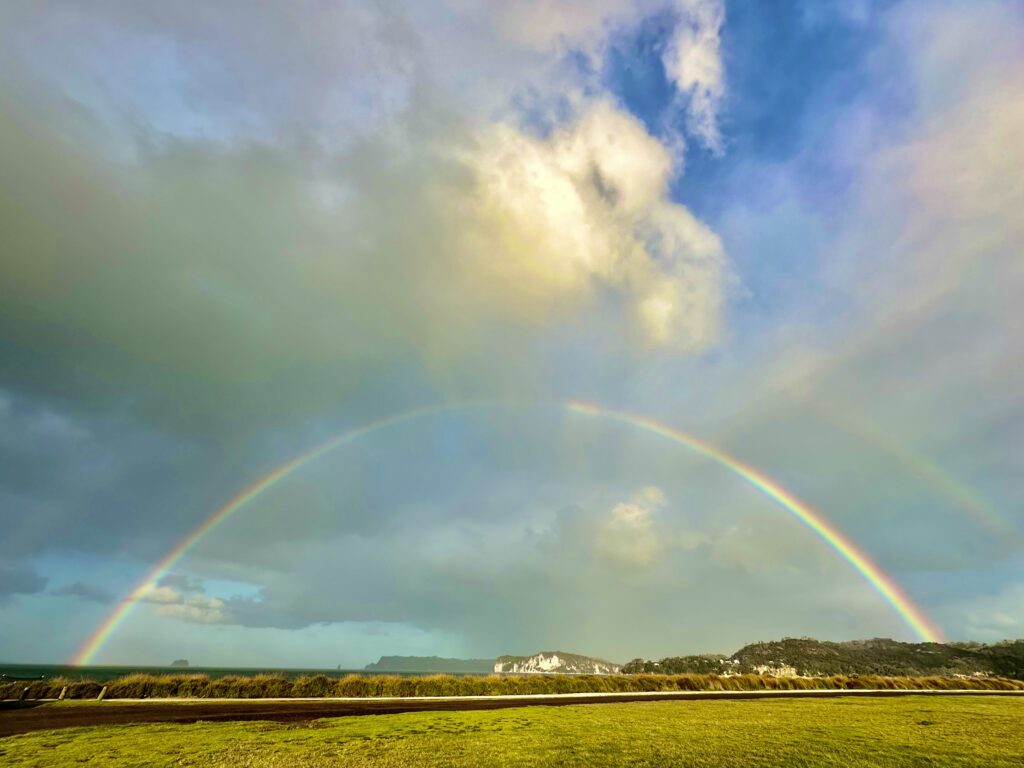
After two years of being on the Partner of a New Zealander Resident Visa, I apply for a Permanent Resident Visa. That is the biggie: the one that will allow me to live in New Zealand, and travel in and out of New Zealand, forever. 🍾 🥂 🎉 🌟
After five years of being a Permanent Resident, I can choose to, but am not required to, apply for New Zealand citizenship. For those of you wondering what the differences are between a Permanent Resident and a Citizen, I have put all of that information at the very end of this post. To answer a common question: yes, being a Permanent Resident gives me the right to vote. To answer a question no one has asked me because who would think to ask this: I recently found out that if I become a NZ citizen, the oath of citiizenship I have to recite begins like this: “I, Hilary Emerson Lay, swear that I will be faithful and bear true allegiance to His Majesty King Charles the Third, King of New Zealand…”. Then, according to Wikipedia, “new citizens then join in the singing of God Defend New Zealand before enjoying a cup of tea.” Americans are allowed to have multiple other citizenships, but I’m legitimately worried that my U.S. citizenship will automatically be revoked upon my swearing allegiance to the Crown?!
So that’s my visa timeline. One visa under my belt, one visa application in the works, one visa left to go after that. If all goes as planned, I should have Permanent Residency around September 2027. 🤞🏼🤞🏼🤞🏼
Here is a pretty picture of nasturtiums growing along a fence in Kaimarama:
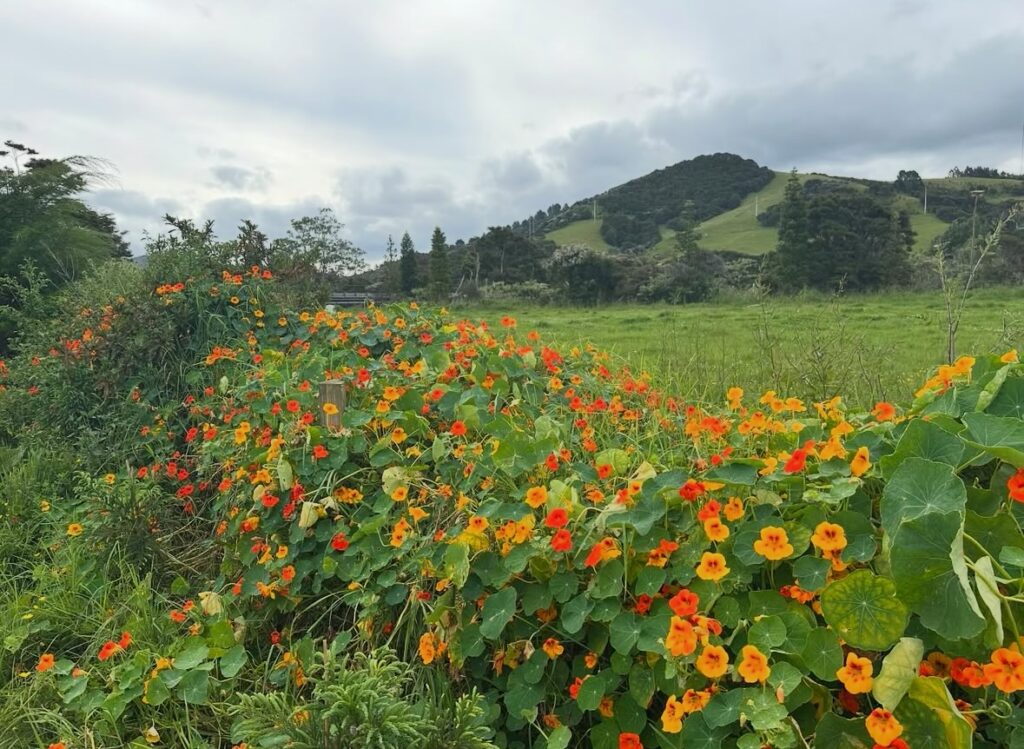
It wasn’t until mid-November, when a fellow American I met at a concert here in NZ reached out to commiserate with me about the outrageous visa price hike, that I found out about the outrageous visa price hike. On October 1 of last year, Immigration New Zealand quietly doubled the cost of all visas.
I say “quietly” because I never read a thing about it. After googling it I found this announcement back in early August saying that Immigration New Zealand would be “significantly” raising its costs as of October 1. It was not a widely covered news story, but it damn well should have been. I find it a horrific oversight that those of us here on any type of visa wouldn’t have gotten a heads-up email from Immigration about the doubling of fees. There’s not much any of us could have done about it, but it would have been nice to at least know.
Here’s how crazy the new prices are: the Partner of a New Zealander Work Visa–the visa I am currently here on–cost me $860 NZD when I applied in March. It now costs $1,630.
(Here is a pretty picture of the view from a customer’s back yard in Matarangi to soften the upcoming blow:)
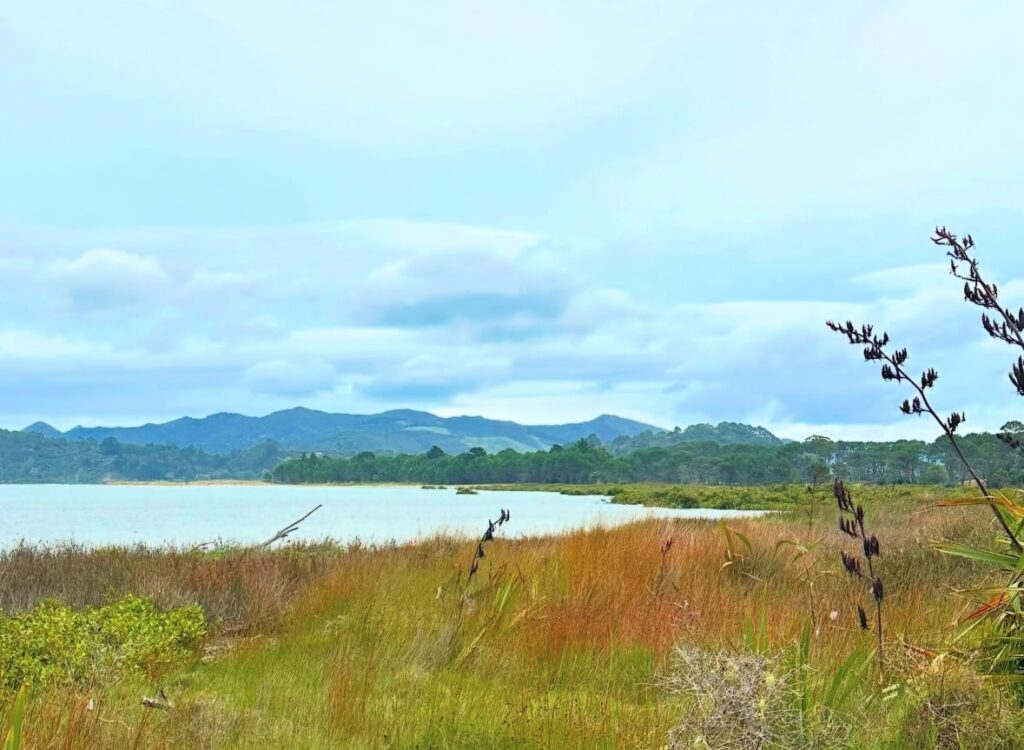
The one I just applied for, The Partner of a NZer Resident Visa, which has always been the most expensive of the three, went from $2,750 NZD ($1,530 USD) to………….
$5,360 NZD. $3,024 USD. 😱
This sudden, massive increase in visa fees is apparently the doing of the National Party, who claim that more money is needed to process the large number of visas they get every year. Opponents say the move will discourage people from moving here, which they claim is National’s intended goal.
Immigration Minister Erica Stanford stated that “these changes aim to shift the cost of the country’s immigration system from taxpayers to those benefiting from it,” and that “the new charges reflect the costs associated with visa processing, assessing, and managing more high-risk applications, and increased compliance costs as we deal with higher levels of migrant exploitation, managing more asylum claims, and maintaining and upgrading Immigration New Zealand’s ICT systems.”
I’m all for reducing migrant exploitation and helping people seeking asylum, and I don’t know or care what an ICT system is. But the “high risk” thing really pisses me off. Because a quick internet search told me that a “high risk” risk visa application would be one where “the applicant is considered likely to pose a potential security risk to the country due to factors such as criminal history or concerns about their character, which leads to a more thorough vetting process by Immigration.” Why should I have to pay more for my not-security-risk-to-the-country visa application so that Immigration can better process a visa application from someone who is “likely” to pose a potential security risk to the country? Shouldn’t they just charge them more??
But some good news did follow the bad news: the processing time for the visa I just applied for went from 9-12 months down to 7 months. The original idea of having to be away from my loved ones back home for 12 months was killing me. So in all honestly, I’d rather have to pay this surprise extra $1,500 and spend less time away from everyone I love back home. The power of positive thinking, right? Also, the exchange rate right now is the best I’ve ever seen ($1 USD to $1.79 NZD), so I put the application fee on my credit card that I pay off in USD—and I get a bunch of airline miles that I’ll use for my next trip home in only 7 (not 12!) months. Win/win.
All of this visa Googling gave me a thought: could I apply for my Resident Visa earlier than May 21, 2025? Did I have to wait until right before my current visa expires to submit my next application? I called Immigration and spoke with a lovely woman named Linda who proceeded to take me on a rollercoaster ride of emotions.
She said that no, I did not have to wait until May to apply for my next visa. The requirement for the Partner of a NZer Resident Visa is that you and your partner have been living together for 12 months. As soon as Stu and I hit the 12 month mark on January 4, I could submit the next visa.
We interrupt this programme to bring you a pretty picture of a fuchsia from our garden:

But then Linda reminded me about something I knew at one point but must have conveniently blocked out: they do not grant Interim Visas for people applying for Resident Visas. When I was here on my 90-day Visitor Visa back in March and submitted my Work Visa, they automatically granted me an Interim Visa that allowed me to stay in NZ (without working, obviously) until they made a decision on my Work Visa. But they do not do Interims for Resident Visas. And I can’t, obviously, be in the country without a valid visa. And since my Work Visa expires May 21, 2025 and my Resident Visa will likely not be approved until July or August 2025, I have one of two unpleasant options:
1: Reapply and re-pay-for the !!@!@#$% Partner Work Visa I’m already on (to the new tune of $1,630 NZD) just to cover me for an approximate two month gap in visas.
2: Leave the country before May 21 and then come back when my Resident Visa is approved. But that would mean leaving NZ for more than two months, and the $1,630 NZD to renew my Work Visa is cheaper than it would be for me to fly home (or anywhere else) and miss work for two months.
“Maybe,” I said to Linda at Immigration in a hopeful little voice, “my Resident Visa will be approved before my Work Visa expires, so I don’t have to pay for it all over again just for, like, 8 weeks of coverage?”.
Linda hesitated. “It’s very unlikely…..but yes. Maybe.”
I’m going to cling to Linda’s “maybe.”
Linda did give me a bit more good news, though: my “police certificate” (aka the FBI background check from Dec 2023) and my expensive medical exams done here in NZ in Jan/Feb 2024 are all still valid for the next visa, meaning I didn’t need to go through and pay for any of that again. Thank god.
Being the neurotic person that I am, I started my visa application back in June, since you can save your progress as you go and I wanted to see what this application entailed and whether or not I’d need to collect even more evidence ahead of time. It’s essentially the exact same application as the one I did last year except they want a little more information for this one. My next post, likely a boring one for most of you, is a step by step breakdown of everything they ask for in the application.
It’s a huge relief that the final visa I need to obtain–the Permanent Resident one–only costs $315 NZD and has a two week approval turnaround time. I’d rather get the shitty expensive one with the longest wait time over with sooner, rather than have it looming down the pipeline.
Pictures from an overnight in Hahei a few weeks ago:
And that’s al the news from here. New Year, hopefully new visa. Now I wait.
Much love to all of you. I’m glad you’re along for this wild ride with me.
H. ❤️
As promised: for anyone who is interested, this is the difference between a Permanent NZ Resident and a NZ Citizen, as taken from the Pathways NZ website (Pathways is a collective of licensed immigration officers):
New Zealand residence entitles the holder the right to live, study and work in New Zealand and to:
• be eligible for publicly funded health and disability services
• have access to education in state education institutions the same as local students and tertiary fee subsidies and student loans (after a qualifying period)
• be eligible for social welfare benefits
• vote in local and general elections
• service on a jury
• to buy a home and property once settled
• have a career in the New Zealand defence forces
In order to be eligible for the grant of New Zealand citizenship a person normally must:
• have held a New Zealand resident visa and lived in New Zealand for a total of at least 1,350 days during the five years immediately before making their citizenship application; and
• have lived in New Zealand for a total of at least 240 days in each year of the five years immediately preceding the date of their application
Citizenship applications are processed by the Citizenship Office which is part of the Department of Internal Affairs, and each person must meet the eligibility and make a separate application.
In addition to all of the above rights conferred by New Zealand residence New Zealand citizenship provides full economic and social rights including:
• holding a New Zealand passport and being able to travel internationally on this passport
• access to New Zealand Embassy/Consular support and assistance when overseas
• standing for New Zealand Parliament and local government roles
• representing New Zealand in international sports (e.g., Olympics)
• being eligible for education scholarships which are only open to New Zealand citizens
• being able to visit, live and work in Australia (by being issued a Special Category Visa automatically on arrival as a New Zealand citizen)


